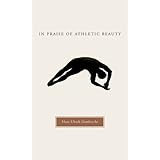
Average Reviews:

(More customer reviews)Overall, I found this book worth reading, a rather broadly-ranging philosophical foray into popular culture. In the hands of a good teacher, it could serve as a non-threatening introduction to philosophy for undergraduates otherwise unlikely to be drawn to such pursuits.
In the end, however, I remain unconvinced. I would like to test Gumbrecht's celebration of spectatorship via an analogy:
Is the series "literature----reader---criticism" analogous to the series "sports---spectator---praise"?
There exists an entire literature of apologetics for literary criticism. The critic engages the author by contextualizing, making connections in the canon, expanding upon ambiguities, unpacking metaphor, etc. The critic contributes substantially to the task of making meaning.
The spectator who praises athletic prowess simply reacts positively. What does he contribute?
The critic has a different set of skills than the author but they are demonstrable skills. He is more than a critic of other people's creations. The spectator praises (and blames) the performance of others; only rarely would the spectator be qualified to be a competitor. Perhaps the pleasure produced by spectating leads to praise. In the rarest of occasions this praise may have aesthetic merit of its own. It remains to demonstrate what value spectating has. How is it not just indolence? How is it more than merely setting myself up as judge of what I could not do. Given the choice, why would I spectate rather than perform?
Put another way: there is no objective value (apart from personal entertainment) in choosing to write bad literature myself. It is objectively of value to read the work of others who have mastered the art of writing and the same holds true for any of the arts. It cannot be argued that there is no objective value in engaging myself to the degree that I am able in athletic activity. There is a clear physiological, psychosomatic advantage to participation over spectating regardless of how well I perform.
A second observation: in the arts, criticism and the development of taste make it possible over time to know how to choose only the best examples for contemplation. This is not possible in sports. On the one hand, this adds a chance dimension--any competition may ultimately include a "magic" moment. On the other, it means one consumes vast amounts of mediocre sport.
Gumbrecht's study leaves a potentially interesting area unexplored: the grey area between sport and dance. The Slavs seem to have had no traditional athletic competitions until they came into regular contact with other European cultures but competitions of dancing prowess were common and highly significant social events. In the 19th/20th centuries, dance led naturally to Slavic adoption of gymnastic clubs (Turnverein) from Germany. But, with dance we cross over Gumbrecht's boundary into the forbidden realm of "meaning."
Click Here to see more reviews about: In Praise of Athletic Beauty
Click here for more information about In Praise of Athletic Beauty

No comments:
Post a Comment